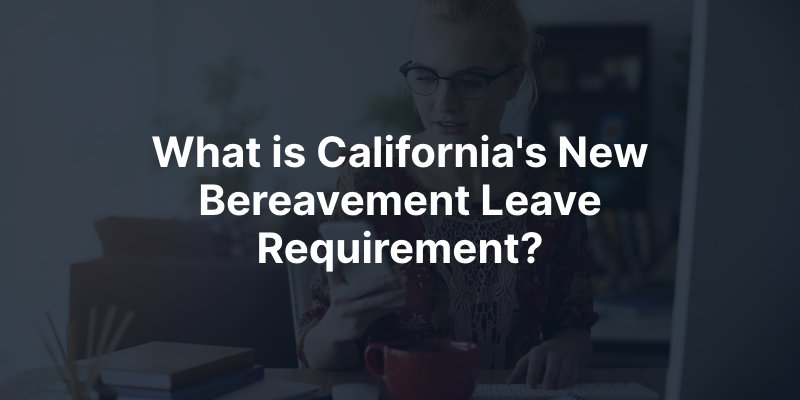California has expanded its employee protections by mandating most private employers to provide up to five days of bereavement leave for the death of a covered family member. Assembly Bill 1949, signed by Governor Newsom, became effective on January 1, 2023.

Previously, bereavement leave in California was solely dependent on an employer’s policy, as there was no specific state requirement. Attempts to legislate bereavement leave in the past faced vetoes. AB 1949 now requires employers with five or more employees to grant employees up to five days of bereavement leave for specific family members’ deaths. Covered family members include spouses, children, parents, siblings, grandparents, grandchildren, state-registered domestic partners, and parents-in-law. Bereavement leave under AB 1949 does not count against the 12 work weeks of available family and medical leave each year under the California Family Rights Act (CFRA). The law mandates that bereavement leave is separate.
Employees are not required to take the five days consecutively and can use the leave intermittently. However, bereavement leave must be completed within three months of the family member’s death. Additionally, the employee must have been employed for at least 30 days before starting leave to be eligible.
The law does not limit employees on how much bereavement leave can be taken annually. This means an employee can take up to five days for each covered family member’s death. For documentation, an employer may request proof of a family member’s death within 30 days of the leave’s start. Acceptable documentation includes a death certificate, published obituary, or verification from a mortuary, funeral home, burial society, crematorium, religious institution, or government agency. Any documentation submitted is required to be kept confidential, disclosed only to internal personnel, counsel, or as required by law.
Whether bereavement leave is paid or unpaid depends on your employer’s policy. AB 1949 allows companies to decide whether to provide the five required days as paid leave. If an employer has a policy for fewer than five paid days, the remaining days can be unpaid. Employees also have the option to use accrued paid leave, if they have it, for any unpaid days.
Yes, your employer must let you return to work, as they are prohibited by law from engaging in discrimination or retaliation against you for requesting or utilizing bereavement leave. As a result, they cannot terminate, demote, suspend, or take any other adverse action against you.
If your employer has violated your right to bereavement leave, for instance, by denying your request or retaliating against you for requesting or taking leave, you can file a complaint with California’s Civil Rights Department (CRD). The CRD is in charge of protecting California employees from unlawful discrimination in the workplace. When filing a complaint, you may submit it in one of the following ways:
2218 Kausen Drive, Suite 100
Elk Grove, CA 95758
Deaf, hard of hearing: 800-700-2320 (TTY)
When filing a complaint, you will need to provide detailed information about the alleged discrimination, retaliation, or violation. This includes information about the parties involved, the nature of the behavior, and any supporting documentation.
After receiving the complaint, the CRD will conduct an investigation. This may involve gathering evidence, interviewing relevant parties, and assessing the merits of the claim. In some cases, the CRD may offer mediation as an optional step to resolve the dispute. Mediation is a voluntary process where a neutral mediator helps the parties reach a mutually agreeable resolution. If the CRD determines that there is sufficient evidence of discrimination, they may issue you a Right-to-Sue letter. This letter grants you the right to file a lawsuit in court.
If your employer has violated your right to bereavement leave, an attorney can provide valuable assistance in several ways:
Legal Assessment
An attorney can assess the details of your situation to determine if your employer’s actions indeed constitute a violation of your right to bereavement leave. They will review relevant laws, company policies, and any contractual agreements.
Documentation and Evidence
Attorneys can help you gather and organize documentation and evidence related to the violation. This may include communications with your employer, company policies, and any other relevant records.
Understanding Your Rights
Your attorney will explain your rights concerning bereavement leave to help you make informed decisions about your next steps.
Negotiations with Employer
An attorney can engage in negotiations with your employer on your behalf. They may attempt to resolve the issue amicably, seeking corrective actions, compensation, or any necessary accommodations.
Filing a Formal Complaint
If necessary, an attorney can assist you in filing a complaint with the CRD. They will ensure that the complaint is properly prepared and submitted within any applicable deadlines.
Issuing Demand Letters
If you decide to sue, a lawyer can draft and send demand letters to your employer outlining the nature of the violation, the legal basis for your claim, and the remedies you are seeking.
Legal Representation in Litigation
If negotiations and administrative processes do not lead to a resolution, an attorney can file a lawsuit against your employer, presenting your case in court and advocating for your rights.
Protecting Against Retaliation
If you fear retaliation for asserting your rights, an attorney can take legal action to protect you from adverse employment actions. This may include filing additional claims if retaliation occurs.
Providing Emotional Support
Dealing with workplace violations can be emotionally challenging. Attorneys not only provide legal guidance but can also offer emotional support during the legal process.
Choosing an experienced Los Angeles Employment Law Attorney attorney you can trust is crucial. They can navigate the complexities of your case, ensuring that your rights are protected and helping you achieve a favorable outcome.